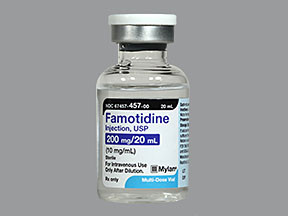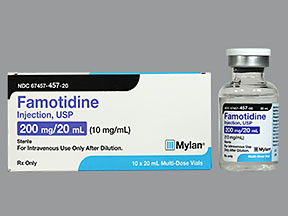FAMOTIDINE - INJECTION
PHONETIC PRONUNCIATION: (fam-OH-tih-dine)
COMMON BRAND NAME(S): Pepcid
GENERIC NAME(S): famotidine
Uses
USES: Famotidine is used to treat ulcers of the stomach and intestines and to prevent intestinal ulcers from coming back after they have healed. This medication is also used to treat certain stomach and throat (esophagus) problems (such as erosive esophagitis, gastroesophageal reflux disease-GERD, Zollinger-Ellison syndrome). It works by decreasing the amount of acid your stomach makes. It relieves symptoms such as cough that doesn't go away, stomach pain, heartburn, and difficulty swallowing. Famotidine belongs to a class of drugs known as H2 blockers. This form of famotidine is given by vein and is used to treat these conditions for a short time when you cannot take the medication by mouth. Your doctor should switch you to taking this medication by mouth when possible.
How to use FAMOTIDINE - INJECTION
HOW TO USE: This medication is injected into a vein as directed by your doctor. The dosage and length of treatment are based on your medical condition and response to treatment. In children, dosage may also be based on body weight. If you are giving this medication to yourself at home, learn all preparation and usage instructions from your health care professional. Before injecting each dose, clean the injection site with rubbing alcohol. Before using, check this product visually for particles or discoloration. If either is present, do not use the liquid. Learn how to store and discard medical supplies safely. Tell your doctor if your condition persists or worsens.
Side Effects
Precautions
Interactions
Overdose
Images
Reviews
Faq for FAMOTIDINE - INJECTION
- Famotidine injection is used to treat certain conditions caused by excessive stomach acid, such as stomach and intestinal ulcers, gastroesophageal reflux disease (GERD), and Zollinger-Ellison syndrome.
- Famotidine injection works by reducing the production of stomach acid. It belongs to a class of medications called H2 blockers, which block the action of histamine on the stomach cells that produce acid.
- Famotidine injection is typically administered by a healthcare professional in a hospital or clinic setting. It is given as an injection into a vein (intravenous) over a period of time.
- Common side effects of famotidine injection include headache, dizziness, diarrhea, constipation, and changes in taste. More serious side effects may include allergic reactions, liver problems, and low platelet count.
- It is important to consult with your healthcare provider before taking famotidine injection if you are pregnant or breastfeeding. They will weigh the potential benefits against the potential risks to both you and your baby.
- Famotidine injection may interact with certain medications, including antacids, sucralfate, and certain antiviral drugs. It is important to inform your healthcare provider about all the medications you are taking to avoid any potential drug interactions.
- Famotidine injection typically starts to work within 30 minutes to 1 hour. However, the exact onset of relief may vary depending on the individual and the condition being treated.
- Famotidine injection is usually used for short-term treatment of conditions related to excessive stomach acid. Long-term use should be done under the guidance of a healthcare professional to monitor for any potential side effects or complications.
- If you miss a dose of famotidine injection, contact your healthcare provider immediately to determine the appropriate course of action. It is important not to double the dose to make up for a missed one.
Disclaimer
IMPORTANT: HOW TO USE THIS INFORMATION: This is a summary and does NOT have all possible information about this product. This information does not assure that this product is safe, effective, or appropriate for you. This information is not individual medical advice and does not substitute for the advice of your health care professional. Always ask your health care professional for complete information about this product and your specific health needs.


No Reviews Yet